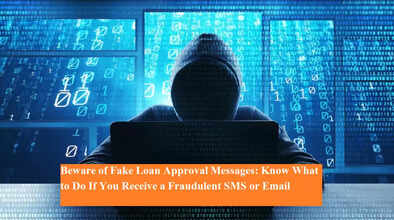Beware of Fake Loan Approval Messages: Know What to Do If You Receive a Fraudulent SMS or Email

Cases of online loan fraud are rapidly increasing across India, with scammers now targeting people through fake “pre-approved loan” messages and emails. These fraudulent messages often claim that your loan has been approved and that you must pay a processing fee before the disbursement. Once the victim transfers the money to the mentioned account, the fraudsters vanish with the funds.
How Loan Approval Scams Work
These scams usually start with an SMS or email that looks authentic — often designed to appear as if it came from a genuine bank or NBFC (Non-Banking Financial Company). The message may include the bank’s logo, a fake customer ID, or even a “loan approval number.” Victims are then asked to pay a small “processing fee” or “verification charge” to get the loan credited into their account.
Once the money is transferred, the fraudsters disappear, leaving the victim with no loan and no way to recover their funds. Experts warn that no legitimate bank or NBFC ever asks for processing fees before loan disbursement. Such fees, if applicable, are usually deducted from the sanctioned loan amount and not paid separately in advance.
Stay Cautious While Using Loan Apps
Another major threat comes from fraudulent mobile loan apps. Many of these apps promise instant loans but instead steal users’ personal information, photos, and contacts. Cybersecurity experts advise never to download unknown loan apps or share sensitive information through them. Always verify apps on official app stores and check reviews before installing.
Fake Websites Imitating Banks
Fraudsters are now going a step further by creating fake websites that look almost identical to the official pages of major banks and financial institutions. These websites ask users for their PAN, Aadhaar, or bank details under the pretext of “loan verification.” Once submitted, the data is used to commit identity theft or other financial frauds.
Before entering any personal details online, always check the website’s domain name carefully. Genuine banking websites usually have “https://” and a secure padlock symbol. Avoid sharing personal or financial details unless you are absolutely sure of the website’s authenticity.
Blackmail and Threat Calls
Some scammers also use intimidation tactics. They threaten to leak personal information, photos, or videos to pressure victims into paying money. Cyber experts suggest not panicking in such cases. If anyone claims to have your personal data or threatens to release private images, simply refuse to cooperate and report the incident to the cybercrime helpline or the police.
Awareness Is the Key
Despite repeated warnings from the Reserve Bank of India (RBI) and the Ministry of Finance, many people still fall victim to such scams. Educated professionals — including doctors, engineers, and professors — have also been deceived. The primary reason is a lack of awareness and fear-based manipulation.
Digital fraudsters exploit people’s anxiety about loans, credit, or legal issues. To stay safe, always verify any loan offer directly with the official bank or NBFC. Avoid responding to unsolicited SMS, emails, or calls offering instant loans.
Remember, no legitimate financial institution will ever ask for advance payment before loan approval or disbursement. If you receive any suspicious message, delete it immediately and report it to the National Cyber Crime Portal (cybercrime.gov.in) or dial 1930, the cyber helpline number.
Staying alert and informed is your best defense against digital loan scams. Never let fear or greed override your judgment — because one careless click can cost you thousands.

